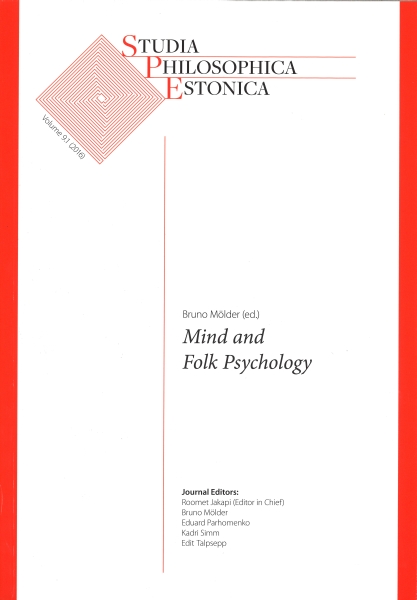Autonomy of Folk Psychology Reconsidered
DOI:
https://doi.org/10.12697/spe.2016.9.1.03Keywords:
folk psychology, autonomy, normativity, rationalityAbstract
It has been a recurring theme in the philosophy of mind that folk psychology is autonomous. This paper has three goals. First, it aims to clarify what the term 'folk psychology' could mean in different contexts. Four widespread senses of the term are distinguished and the one eligible for autonomy is picked out. Secondly, a classic argument for autonomy is introduced and motivated. This is the argument from the normativity of folk psychology, based on its constitutive rationality. According to this argument, mentalistic concepts are to be understood as components of prescriptions for a rational course of action, rather than descriptions. Thirdly, limits of the argument from normativity are demonstrated. At best, the argument applies to merely a small segment of explanations in terms of mentalistic vocabulary, as the latter is meant to convey much more than simply normative content about the rational profile of an agent.
References
Andrews, K. (2003). Knowing Mental States: The Asymmetry of Psychological Prediction and Explanation, in Q. Smith & A. Jokic (eds), Consciousness: New Philosophical Perspectives, Oxford, Oxford University Press, pp. 201-219
Bermúdez, J. L. (2005). Philosophy of Psychology: A Contemporary Introduction, New York, Routledge.
Bernecker, S. (2010). Memory: A Philosophical Study, Oxford, Oxford University Press.
Bohl, V. (2014). We read minds to shape relationships. Philosophical Psychology, 28: 674-694
Churchland, P. M. (1981). Eliminative Materialism and the Propositional Attitudes. The Journal of Philosophy, 78: 67-90.
Craver, C. F. (2007) Explaining the Brain: Mechanisms and the Mosaic Unity of Neuroscience. 1st edition, Oxford, Oxford University Press.
Davidson, D. (1974). Psychology as Philosophy, in S. C. Brown (ed), Philosophy of Psychology, pp. 41-52.
Dennett, D. C. (1969). Content and Consciousness, London, Routledge.
Dennett, D. C. (1987). The Intentional Stance, Cambridge, MA, The MIT Press.
Dennett, D. C., & Kinsbourne, M. (1992). Time And The Observer: the Where and When of Consciousness in the Brain. Behavioral and Brain Sciences, 15: 183-247.
Drayson, Z. (2012). The Uses and Abuses of the Personal/Subpersonal Distinction. Philosophical Perspectives, 26: 1-18.
Drayson, Z. (2014). The Personal/Subpersonal Distinction. Philosophy Compass, 9: 338-346.
Gallagher, S. (2008). Inference or interaction: social cognition without precursors. Philosophical Explorations, 11: 163-174.
Gauker, C. (2003). Attitudes without Psychology. Facta Philosophica, 5: 239-256.
Godfrey-Smith, P. (2005). Folk-Psychology as a Model. Philosophers' Imprint, 5: 1-16.
Goldman, A. I. (1993). The Psychology of Folk Psychology. Behavioral and Brain Sciences, 16: 15-28.
Goldman, A. I. (2000). Folk psychology and mental concepts. Protosociology, 14: 4-25.
Gopnik, A., & Meltzoff, A. N. (1997). Words, Thoughts, and Theories, Cambridge, MA, A Bradford Book.
Greenwood, J. D. (Ed.). (1991). The Future of Folk Psychology: Intentionality and Cognitive Science, Cambridge, Cambridge University Press.
Hornsby, J. (1997). Simple Mindedness: In Defence of Naive Naturalism in the Philosophy of Mind, Cambridge, MA, Harvard University Press.
Hornsby, J. (2000). Personal and Sub-Personal: A Defence of Dennett's Early Distinction. Philosophical Explorations, 3: 6-24.
Hutto, D. D. (2008). Folk Psychological Narratives: The Sociocultural Basis of Understanding Reasons, Cambridge, MA, The MIT Press.
Jackson, F., & Pettit, P. (1990). In Defence of Folk Psychology. Philosophical Studies, 59: 31-54.
Knobe, J. (2007). Folk psychology: science and morals, in D. D. Hutto & M. Ratcliffe (eds), Folk Psychology Re-assessed, Dordrecht, Springer, pp. 157-174.
Knowles, J. (2002). Is Folk Psychology Different? Erkenntnis, 57: 199-230.
Lewis, D. K. (1972). Psychophysical and theoretical identifications. Australasian Journal of Philosophy, 50: 249-258.
McDowell, J. H. (1998). Mind, Value, and Reality, Cambridge, MA & London, Harvard University Press.
McHugh, C., & Whiting, D. (2014). The Normativity of Belief. Analysis, 74: 698-713.
Medin, D. L., & Atran, S. (1999). Folkbiology, Cambridge, MA, MIT Press.
Morton, A. (1996). Folk Psychology is not a Predictive Device. Mind, 105: 119-137.
Morton, A. (2007). Folk Psychology Does Not Exist, in D. D. Hutto & M. Ratcliffe (eds), Folk Psychology Re-assessed, Dordrecht, Springer, pp. 211-222.
Mölder, B. (2011). Normatiivsuse mitu tahku. Studia Philosophica Estonica, 4: 42-82.
Nichols, S., & Stich, S. P. (2003). Mindreading: An Integrated Account of Pretence, Self-Awareness, and Understanding Other Minds, Oxford, Oxford University Press.
Ratcliffe, M. (2007). Rethinking Commonsense Psychology: A Critique of Folk Psychology, Theory of Mind and Simulation, Hampshire & New York, Palgrave Macmillan.
Ratcliffe, M., & Hutto, D. D. (2007). Introduction, in D. D. Hutto & M. Ratcliffe (eds), Folk Psychology Re-assessed, Dordrecht, Springer, pp. 1-22
Ravenscroft, I. (2009). Is folk psychology a theory? in J. Symons & P. Calvo (eds), The Routledge Companion to Philosophy of Psychology, New York, Routledge, pp. 131-147.
Sellars, W. S. (1956). Empiricism and the philosophy of mind, in H. Feigl & M. Scriven (eds), Minnesota Studies in the Philosophy of Science, Minneapolis, University of Minnesota Press, pp. 243-329.
Stich, S. P., & Ravenscroft, I. (1994). What is Folk Psychology? Cognition, 50: 447-468.
Stich, S. P., & Nichols, S. (2003). Folk Psychology, in S. P. Stich & T. A. Warfield (eds), The Blackwell Guide to Philosophy of Mind, Malden, MA, Blackwell Publishing, pp. 235-255.
Stueber, K. R. (2009). The Ethical Dimension of Folk Psychology? Inquiry, 52: 532-547.
Zawidzki, T. W. (2013). Mindshaping: A New Framework for Understanding Human Social Cognition, Cambridge, MA, The MIT Press.





